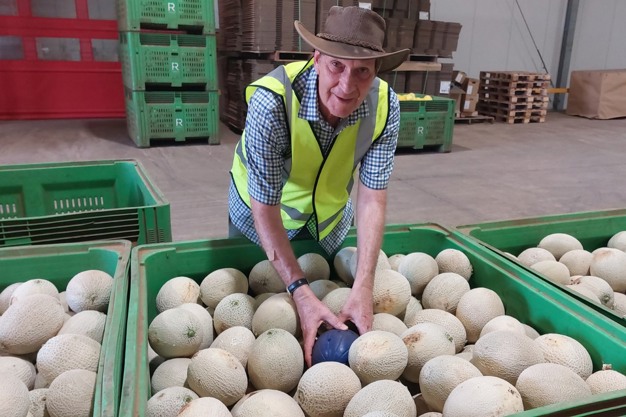A project to improve the quality of Australian melons is "making good progress" in its aim to help growers meet the new minimum maturity standards that were set by the industry last year.
In addition to making sure melons meet the taste expectations of Australians, the project also aims to ensure the condition of the melons is acceptable to consumers as well. Led by Delytics Ltd in partnership with Melons Australia and Rudge Produce Systems, the Melon Quality Improvement Program VM23002 project is funded by Hort Innovation using the melon research and development levy and funds from the Australian Government.
This new three-year project will build on the previous project VM21001 (Quality Improvements in the Melon Supply Chain VM21001), which developed minimum maturity standards for rock melons, watermelon and honeydew. One of the key objectives for this follow-on project, which started in March this year, is to develop tools and processes that will help growers and other key members of the Australian melon supply chain consistently meet the new standards.

Project Manager and Delytics Managing Director, Mark Loeffen, spent several days in the Northern Territory in September using a simulated melon to monitor the impact of on-farm transport and handling on several varieties of melons. The data collected will help the project team understand the accelerations of fruit during the journey from the harvesting paddock to the packhouse. Research is also underway to monitor the effects of transportation between the packhouse and the distribution centre.
"The phase one project, which we completed in February 2024, was focused on benchmarking the quality of melons available to consumers and working out what minimum maturity standards were needed to ensure consumers will enjoy eating melons, and feel confident to buy more. The phase one project achieved its goal," Mr Loeffen said. "This phase two project allows us to work with growers directly to help the industry improve the eating quality of melons and restore consumer confidence."
On-farm monitoring started in April and will continue through the duration of the project. Mr Loeffen says the on-farm monitoring will improve the project team's understanding of how melons mature on-farm and help them develop effective tools and processes that will help growers know when to pick to meet the new standards.
Along with continuing to monitor fruit maturity against the new standards, the project team has also started testing the impacts of transportation on melon conditions. This will ensure that consumers accept the condition of the fruit as well as the taste. The project team will use the research findings to develop guidelines about the maximum safe accelerations to help protect the fruit during transport.
The intended outcome of this project is to improve the quality of melons available to consumers at wholesale and retail over the life of the project, with monitoring against the new standards showing increased consumer acceptability. This will lead to increased consumption and demand.
"This project will help us to quickly and permanently improve these results, as we have done in previous projects for citrus and table grapes," Mr Loeffen said. "We know that putting the right processes in place will improve and maintain the eating quality of Australian melons, which will increase consumer demand. In this first year of the project, we will be working with growers who are keen to help lead the industry by providing the on-farm data we need to identify what tool options will help them meet the standards. We will then work with them to co-design and trial the tools to make sure they are fit for purpose."
The Nielsen Harvest to Home results from May 2024 showed that melons are performing better than last year. In terms of dollar sales growth, melons have grown by 11.6%, while rising fast in terms of volume at 17%. The average dollars spent rose from $32.43 to $35.33 and the annual amount purchased increased from 10.6kg to 12.10kg on the previous year. The number of melon-buying households rose from 56.3% in 2023, to 60% in May 2024.
For more information contact:
Mark Loeffen
Delytics Ltd
Phone: +64 7 857 0854
+64 27 294 2217
[email protected]
www.delytics.com
Johnathon Davey
Melons Australia
[email protected]
www.melonsaustralia.org.au
